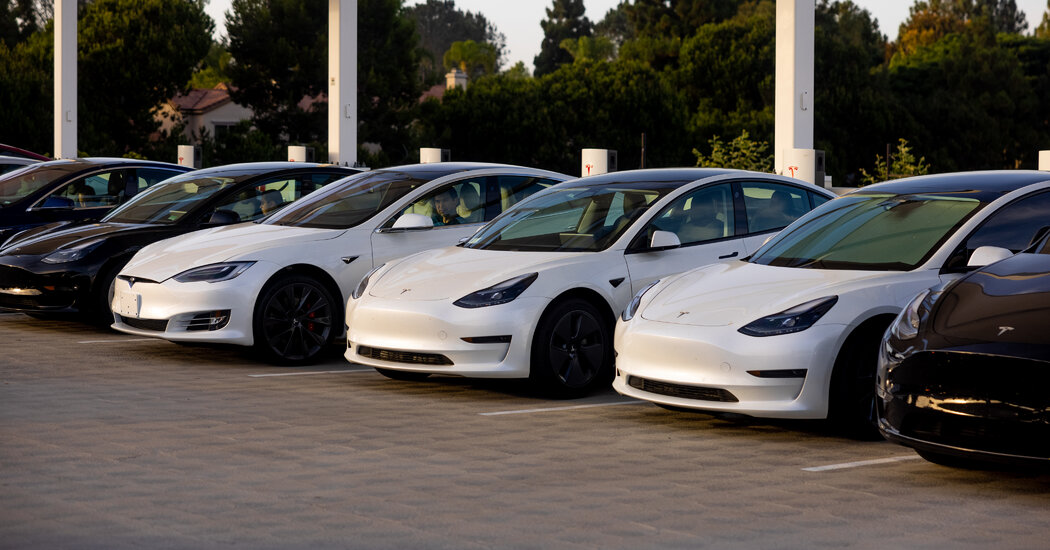
Tesla reported Sunday that it delivered 936,000 cars in 2021, an 87 percent increase from the year before, despite the computer chip shortage that has disrupted auto production around the world.
In the fourth quarter alone, the company delivered more than 308,000 vehicles, a 71 percent increase from the quarter a year earlier. The overwhelming share of the deliveries were of the Model 3 sedan and the Model Y hatchback. Wall Street analysts had been expecting deliveries of about 266,000 cars in the fourth quarter, and about 855,000 for the year.
“The numbers are hard to poke holes in,” Daniel Ives, an analyst at Wedbush Securities, wrote in a note to investors. “While there are many competitors in the E.V. space, Tesla continues to dominate market share as evidenced again this quarter.”
Tesla increased sales despite a global shortage of computer chips, which serve as the brains for a variety of electronics, including engine controllers and touch screens. The shortage forced most automakers to idle some plants for weeks at a time and kept them from producing as many vehicles as they had planned.
In July, Tesla’s chief executive, Elon Musk, said his company was overcoming the shortage by switching to types of chips that were more readily available and writing new instructions, or firmware, to be embedded into the chip. Tesla can make such a switch because the components in its cars are designed to be controlled largely by software.
Understand the Supply Chain Crisis
Tesla does not break out its deliveries by country. Much of its recent growth has been propelled by sales in Europe and China.
The jump in deliveries capped a momentous year in which Tesla’s stock price and profits soared. It has also worked to open factories near Austin, Texas, as well as Berlin, in hopes of sustaining its rapid growth.
In October, Tesla’s market value for the first time exceeded $1 trillion, making it more valuable than General Motors, Ford Motor, Toyota, Volkswagen, Stellantis, BMW and several other automakers combined.
On Friday, Tesla’s stock closed at $1,056.78, up from just under $700 at the end of 2020. The stock’s rise was fueled by increasing sales and profits. In the third quarter, the company earned $1.6 billion, more than double its earnings in all of 2020, its first profitable year.
With shares at dizzying heights, Mr. Musk began selling large chunks of his stock, partly to cover taxes, after taking a poll among his followers on Twitter. Several times he said he was done selling but continued.
In total, Mr. Musk sold more than $16 billion worth of Tesla stock. The transactions involved the exercising of 22.8 million options awarded to Mr. Musk as part of his compensation and bonus packages.
Tesla has said it hopes deliveries will increase about 50 percent a year for the next several years, and is counting on output from its Austin and Berlin factories to reach its goal. Both factories are expected to begin producing Model Y hatchbacks soon.
At the same time, Tesla’s product quality has remained uneven. On Thursday, the company told federal regulators that it planned to recall more than 475,000 cars for two separate defects that could affect safety — a misaligned latch on the front hood, which could allow the hood to open unexpectedly, and wiring to the rearview camera that can be damaged by opening and closing the trunk. A day later, vehicles in China were recalled as well.
How the Supply Chain Crisis Unfolded
The pandemic sparked the problem. The highly intricate and interconnected global supply chain is in upheaval. Much of the crisis can be traced to the outbreak of Covid-19, which triggered an economic slowdown, mass layoffs and a halt to production. Here’s what happened next:
In addition, the company and its Autopilot driver-assistance system have come under closer scrutiny by safety regulators in the United States. Teslas have been involved in a series of crashes with other vehicles, including some that resulted in fatalities, while the Autopilot system was engaged.
The company continues to promote its Autopilot system, which can take over some of the steering, braking and accelerating tasks from drivers, and a more advanced set of features, Full Self Driving, that it offers for $10,000 but has so far allowed only a select group of customers to test.
In August, the National Highway Traffic Safety Administration opened a formal investigation into how Autopilot recognizes objects on the road. It is specifically looking into 11 instances when Teslas crashed into emergency vehicles that had stopped on highways and had their lights flashing.
The agency is also looking at more than two dozen other crashes involving Teslas that were under Autopilot control. Eight of those crashes have resulted in a total of 10 deaths since the first occurred in 2016.



